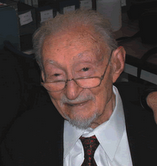
Seymour Lubetzky
Encyclopedia

Seymour Lubetzky was a major cataloging
Cataloging
Cataloging is the process of listing or include something in a catalog. In library science is is the producing of bibliographical descriptions of books or other kinds of documents...
theorist and a prominent librarian. Born in Belarus
Belarus
Belarus , officially the Republic of Belarus, is a landlocked country in Eastern Europe, bordered clockwise by Russia to the northeast, Ukraine to the south, Poland to the west, and Lithuania and Latvia to the northwest. Its capital is Minsk; other major cities include Brest, Grodno , Gomel ,...
as Shmaryahu Lubetzky, he worked for years at the Library of Congress
Library of Congress
The Library of Congress is the research library of the United States Congress, de facto national library of the United States, and the oldest federal cultural institution in the United States. Located in three buildings in Washington, D.C., it is the largest library in the world by shelf space and...
. He worked as a teacher before he immigrated to the United States in 1927. He earned his BA from UCLA in 1931, and his MA from UC Berkeley in 1932.http://www.scienceblog.com/community/older/archives/O/b/ucl1940.shtml Lubetzky also taught at the UCLA Graduate School of Education and Information Studies
UCLA Graduate School of Education and Information Studies
The Graduate School of Education and Information Studies is one of the professional graduate schools at the University of California, Los Angeles...
, then the School of Library Service.
Fluent in six languages, Lubetzky published three groundbreaking books that greatly advanced the discipline of cataloging, the organization of knowledge, and modern research methods, still influential in areas of information technology
Information technology
Information technology is the acquisition, processing, storage and dissemination of vocal, pictorial, textual and numerical information by a microelectronics-based combination of computing and telecommunications...
. Librarianship in particular and information science
Information science
-Introduction:Information science is an interdisciplinary science primarily concerned with the analysis, collection, classification, manipulation, storage, retrieval and dissemination of information...
in general had not been revolutionized as much since the likes of Antonio Panizzi, Charles Ammi Cutter
Charles Ammi Cutter
Charles Ammi Cutter is an important figure in the history of American library science.Born in Boston, Massachusetts, Cutter was appointed assistant librarian of Harvard Divinity School while still a student there...
or Paul Otlet
Paul Otlet
Paul Marie Ghislain Otlet was an author, entrepreneur, visionary, lawyer and peace activist; he is one of several people who have been considered the father of information science, a field he called "documentation". Otlet created the Universal Decimal Classification, one of the most prominent...
. Cataloging Rules and Principles and Principles of Cataloging, as well as several periodical articles, solidified Lubetzky as one of the most significant influences in his field. Lubetzky's theory of cataloging went far beyond the Dewey Decimal System. He developed a rationalized approach to catalog code design, one that is even more relevant today as current cataloging principles are revisited and revised for a digital environment.
His unfinished book, Code of Cataloging Rules... unfinished draft (1960), was the basis for modern cataloging adopted by the first International Conference on Cataloging Principles (1961) held in Paris
Paris
Paris is the capital and largest city in France, situated on the river Seine, in northern France, at the heart of the Île-de-France region...
, France
France
The French Republic , The French Republic , The French Republic , (commonly known as France , is a unitary semi-presidential republic in Western Europe with several overseas territories and islands located on other continents and in the Indian, Pacific, and Atlantic oceans. Metropolitan France...
, called the "Paris Principles." The code which eventually emerged from the conference was a landmark in the history of universal bibliographic control. In 1967 it developed into the Anglo-American Cataloging Rules, which subsequently has been revised over the years.
Lubetzky built upon and expanded the ideas of Panizzi and Cutter to create a vision of a catalog that was truly user-friendly. Whereas Cutter had not distinguished between the idea of a "book" and the idea of the "work" in formulating his objectives, Lubetzky contrasts the two ideas, bringing back into play Panizzi’s original emphasis on the relationship between a title and all of the different editions of that title that might exist. Lubetzky’s idea was that relationships among all the editions and variations of a given work and the author of that work, in all variations of the author’s name, must be established and brought together so they can be found in one place. All the works of a given author, in all their editions, should be linked together. As he said years later, at a 1977 conference in Los Angeles called “The Catalog in the Age of Technological Change,” “The catalogue has to tell you more than what you ask for…. The answer of a good catalogue is not to say yes or no, but … to tell [the user] that the library has [the item] in so many editions and translations, and you have your choice” (From an audio clip posted by William Denton http://www.miskatonic.org/library/frbr.html)
Lubetzky was immortalized in two books, entitled Seymour Lubetzky: Writings on the Classical Art of Cataloging and Future of Cataloging: The Lubetzky Symposium.
Just before his 104th birthday, the American Library Association
American Library Association
The American Library Association is a non-profit organization based in the United States that promotes libraries and library education internationally. It is the oldest and largest library association in the world, with more than 62,000 members....
awarded Lubetzky its highest honor, an honorary lifetime membership.
See also
- List of famous librarians

